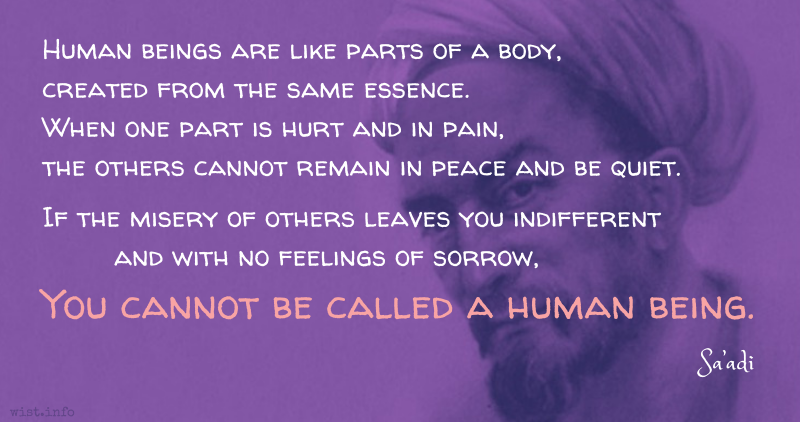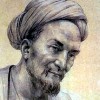Human beings are like parts of a body,
created from the same essence.
When one part is hurt and in pain,
the others cannot remain in peace and be quiet.
If the misery of others leaves you indifferent
and with no feelings of sorrow,
You cannot be called a human being.بنیآدم اعضای یک دیگرند
که در آفرينش ز یک گوهرند
چو عضوى بهدرد آورَد روزگار
دگر عضوها را نمانَد قرار
تو کز محنت دیگران بیغمی
نشاید که نامت نهند آدمیSa'adi (1184-1283/1291?) Persian poet [a.k.a. Sa'di, Moslih Eddin Sa'adi, Mushrif-ud-Din Abdullah, Muslih-ud-Din Mushrif ibn Abdullah, Mosleh al-Din Saadi Shirazi, Shaikh Mosslehedin Saadi Shirazi]
“Bani Adam [The Children of Adam],” Gulistan [Rose Garden], ch. 1 “On the Conduct of Kings,” story 10 (1258)
(Source)
Also known as the "Poem on Humanity" or "Human Beings". This translation was quoted by President Carter in a toast to the Shah of Iran (31 Dec 1977). (Source (Persian)).
The poem, some of the most famous Persian/Iranian verses, was suggested as a motto for the League of Nations in 1928. It was long falsely rumored that the Bashiri translation (below) was posted as the entrance to the United Nations building in New York; however, a carpet with the poem inscribed in Persian was installed in 2005 in a meeting hall in the interior of the building. There is also a plaque on the wall of the UN commemorating the United Nations Year of Dialogue Among Civilizations (2001) with the Eastwick (1880?) translation (below).
Transliterations:[Bani Aadam `aazaye yek pigarand
Keh dar aafarinesh ze yek guharand
Cho `ozvi be dard aavarad rozigaar
Degar ozvahaa raa namaanad qaraar
To kaz mehnate digaraan bi ghami
Nashaayad ke naamat nahand Aadami]
[Source][banī ādam aʿzāy-e yek digarand
keh dar āfarīniesh zeh yek goharand
cho ʿozvī beh dard āwarad roozgār
degar ʿozvhā rā namānad qarār
to k'az meḥnat-e dīgarān bīghamī
nashāyad keh nāmat nahand ādamī]
[Source][Bani aadam a'adhaae yek peikarand,
Ke dar aafarinesh ze yek guharand.
Chu 'udhwi bedard aawarad ruuzgaar,
Degar 'udhwhaa raa namaanad gharaar.
Tu kaz mehnate digaraan biqamii,
Nashaayad ke naamat nehand aadami.]
[Farooqi (1987)]
Alternate translations:All Adam's race are members of one frame,
Since all, at first, from the same essence came.
When by hard fortune one limb is oppressed,
The other members lose their wonted rest:
If thou feel'st not for others' misery,
A son of Adam is no name for thee.
[tr. Eastwick (1852)]All human beings are members of one frame,
Since all, at first, from the same essence came.
When time afflicts a limb with pain
The other limbs at rest cannot remain.
If thou feel not for other’s misery
A human being is no name for thee.
[tr. Eastwick (1880?); it is suggested this is the 1880 translation by Eastwick, but that is the same as the 1852 above.]The sons of Adam are limbs of each other,
Having been created of one essence.
When the calamity of time affects one limb
The other limbs cannot remain at rest.
If thou hast no sympathy for the troubles of others
Thou art unworthy to be called by the name of a human.
[tr. Burton (1888)]All men are members of the same body,
Created from one essence.
If fate brings suffering to one member,
The others cannot stay at rest.
You who remain indifferent
To the burden of pain of others,
Do not deserve to be called human.
[tr. Rehatsek (1888)]All Adam's sons are limbs of one another
Each of the self-same substance as his brother.
So while one member suffers aches and grief,
The other members cannot win relief.
Thou, who are heedless of thy brother's pain,
It is not right at all to name thee man.
[tr. Arberry (1945)]Human beings are members of a whole,
In creation of one essence and soul.
If one member is afflicted with pain,
Other members uneasy will remain.
If you have no sympathy for human pain,
The name of human you cannot retain.
[tr. Aryanpour (1970)]Adam's sons are body limbs, to say;
For they're created of the same clay.
Should one organ be troubled by pain,
Others would suffer severe strain.
Thou, careless of people's suffering,
Deserve not the name, "human being."
[tr. Dastjerdi (1999)]Of One Essence is the Human Race,
Thusly has Creation put the Base.
One Limb impacted is sufficient,
For all Others to feel the Mace.
The Unconcern'd with Others' Plight,
Are but Brutes with Human Face.
[tr. Bashiri (2003)]All men and women are to each other
the limbs of a single body, each of us drawn
from life’s shimmering essence, God’s perfect pearl;
and when this life we share wounds one of us,
all share the hurt as if it were our own.
You, who will not feel another’s pain,
you forfeit the right to be called human.
[tr. Newman (2004)]Man’s sons are parts of one reality
Since all have sprung from one identity;
If one part of a body’s hurt, the rest
Cannot remain unmoved and undistressed;
If you’re not touched by others’ pain, the name
Of “man” is one you cannot rightly claim.
[tr. Davis (2012)]Human beings are limbs of one body indeed;
For, they’re created of the same soul and seed.
When one limb is afflicted with pain,
Other limbs will feel the bane.
He who has no sympathy for human suffering,
Is not worthy of being called a human being.
[tr. Salami]All human beings are in truth akin,
All in creation share in one origin.
When fate allots a member pangs and pains,
No ease for other members then remains.
If, unperturbed, another's grief canst can,
Thou are not worthy of the name of man.
[tr. Sharp]Human beings are body parts of each other,
In creation they are indeed of one essence.
If a body part is afflicted with pain,
Other body parts uneasy will remain.
If you have no sympathy for human pain,
The name of human you shall not retain.
[Source]Adam's children are limbs of one body
That in creation are made of one gem.
When life and time hurt a limb,
Other limbs will not be at ease.
You who are not sad for the suffering of others,
Do not deserve to be called human.
[Source]The children of Adam are the members of each other,
who are in their creation from the same essence.
When day and age hurt one of these members,
other members will be left (with) no serenity.
If you are unsympathetic to the misery of others,
it is not right that they should call you a human being.
[Source]
Quotations by:
Sa’adi
If you desire power, desire nothing
but contentment, which is its own kingdom.Sa'adi (1184-1283/1291?) Persian poet [a.k.a. Sa'di, Moslih Eddin Sa'adi, Mushrif-ud-Din Abdullah, Muslih-ud-Din Mushrif ibn Abdullah, Mosleh al-Din Saadi Shirazi, Shaikh Mosslehedin Saadi Shirazi]
Gulistān [Rose Garden, گُلِستان], ch. 2 “On the Morals of Dervishes,” Story 28 (1258) [tr. Rehatsek/Newman (2004)]
(Source)
Alternate translations:If you want riches, seek only for contentment which is inestimable wealth.
[tr. Gladwin (1806)]Wouldest thou be rich, seek, but content to gain;
For this a treasure is that ne'er will harm.
[tr. Eastwick (1852)]If thou wishest for power, covet nothing
Except contentment which is sufficient happiness.
[tr. Burton (1888)]If thou covetest riches, ask not but for contentment, which is an immense treasure.
[tr. Ross (1900)]Seek not, if thou desire riches,
Aught but contentment, for it is an agreeable treasure.
[tr. Platts (1904)]
Whoseover interrupts the conversation of others to make a display of his own wisdom, certainly betrays his ignorance.
Sa'adi (1184-1283/1291?) Persian poet [a.k.a. Sa'di, Moslih Eddin Sa'adi, Mushrif-ud-Din Abdullah, Muslih-ud-Din Mushrif ibn Abdullah, Mosleh al-Din Saadi Shirazi, Shaikh Mosslehedin Saadi Shirazi]
Gulistān [Rose Garden, گُلِستان], ch. 8 “Rules for Conduct in Life,” Maxim 82 (1258) [tr. Gladwin (1806)]
(Source)
Alternate translations:Whoever interrupts the conversation of others to display the extent of his wisdom, will assuredly discover the depth of his folly.
[tr. Eastwick (1852), #82]Who interrupts the conversation of others that they may know his excellence, they will become acquainted only with the degree of his folly.
[tr. Burton (1888), #58]Whoever interrupts the conversation of others to make a display of his own fund of knowledge, makes notorious his own stock of ignorance.
[tr. Ross (1900), #96]If any one interrupts the speech of others in order that people may know his stock of learning, they will discover the extent of his ignorance.
[tr. Platts (1904), #86]Those whose conversation has been interrupted by a man trying to show off his intelligence will know him instead by the depth of his ignorance.
[tr. Rehatsek/Newman (2004), #84]
To be good and to be ill spoken of by the people
Is better than to be bad and considered good by them.
Drop upon drop collected will make a river. Rivers upon rivers collected will make a sea.
I complained before a learned man that someone had accused me of corruption. He said, “Put him to shame by your good conduct.”
In conversation, remember two principles: Think before speak; stop talking before they say, “Enough.”


